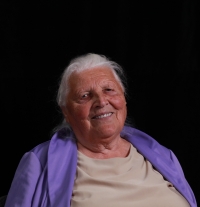People are not enough mature to be able to live in democracy

Download image
Bohuslava Dvořáková was born on 21 April 1936 in Subcarpathian Rus in the family of a Czech teacher. When she was one year old, the family moved back to the Czechoslovakia. Her father was arrested by Gestapo during the war and he avoided the penalty only thanks to an intervention of family doctor, who was their acquaintance from Subcarpathian Rus. The family spent the end of the war in Hoštice near Volyně which was liberated by the US Army. She took over her father’s occupation, she taught for more than 20 years at the primary school in Frymburk and later in other villages in Lipensko region where she met with children from the families of non-expelled Germans, remigrants and resettlers. In 1958 she witnessed the first unplanned flooding of Lipno dam. In August 1968, the commanders of Soviet occupation units visited the primary school in Frymburk. Her older son Bohuslav reached the rank of general, worked in NATO and took part in the military mission in Bosnia and later in Afghanistan. In 2021 the witness lived in Frymburk.
